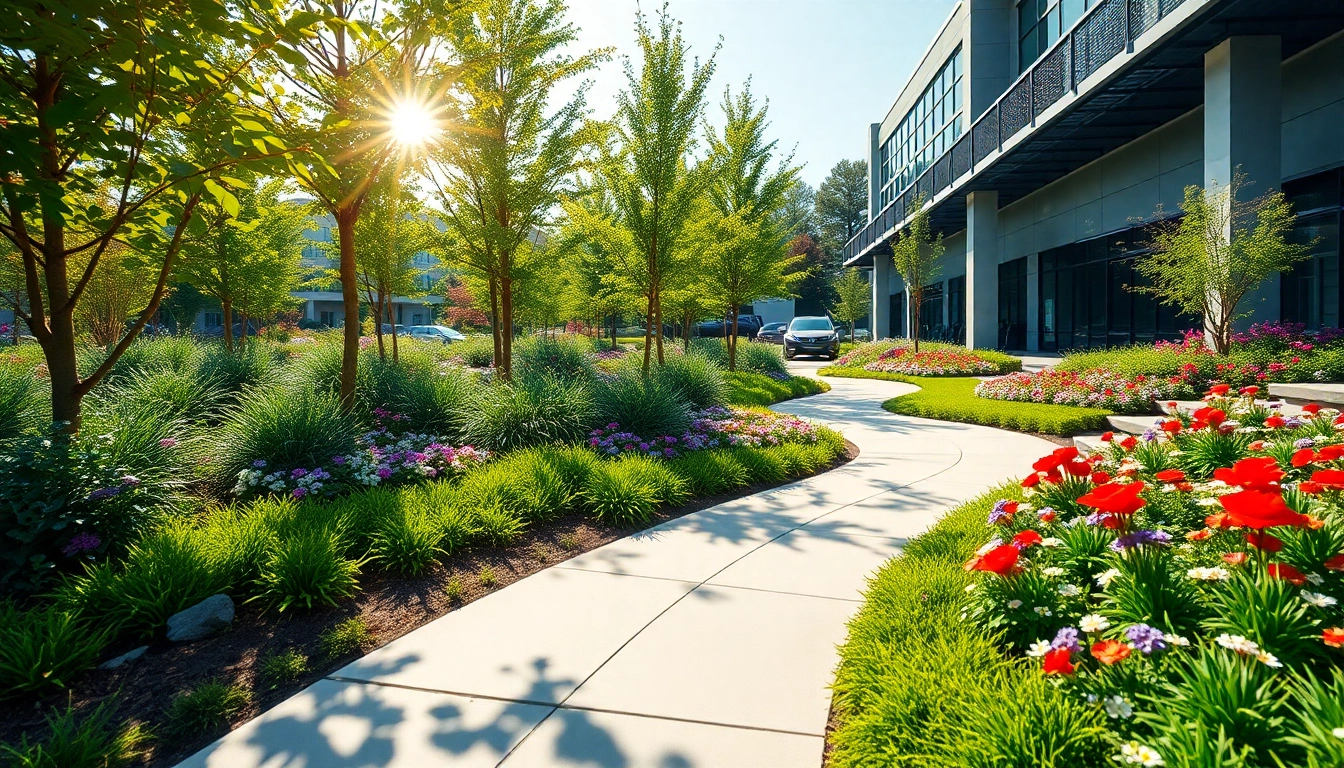Understanding the Role of Commercial Landscaping Contractors
Commercial landscaping contractors play a vital role in shaping the outdoor aesthetics and functionality of various types of commercial properties, from office buildings to shopping centers. They provide a range of services aimed at enhancing the visual appeal, health, and usability of outdoor spaces. Their expertise not only beautifies vast expanses of concrete and asphalt but also creates inviting environments for employees, clients, and customers. Engaging commercial landscaping contractors ensures that the projects meet industry standards, comply with local regulations, and fulfill the specific needs of each property.
What Services Do They Offer?
Commercial landscaping contractors offer a wide array of services designed to meet the unique needs of commercial clients. These services often include:
- Landscape Design: Working with architects and property managers to create plans that enhance the exterior appearance and functionality of commercial spaces.
- Installation: Implementing landscape designs, which may include planting trees, shrubs, and flowers, as well as installing hardscaping features like patios, walkways, and decorative stone.
- Maintenance: Regular upkeep services such as mowing, pruning, fertilization, and pest management to ensure that the landscape stays healthy and attractive throughout the year.
- Irrigation Systems: Designing and installing efficient irrigation systems to ensure proper water supply to plants, reducing wastage and promoting sustainability.
- Seasonal Services: Offering snow removal in winter or seasonal planting changes to keep landscapes vibrant during all seasons.
- Consultation: Providing expert advice on landscape choices that align with sustainability practices, zoning laws, and budget constraints.
Key Differences from Residential Landscaping
While residential landscaping focuses on individual homes, commercial landscaping contractors operate on a larger scale, addressing the needs of businesses and public spaces. Here are some key differences:
- Scope of Work: Commercial landscaping projects are typically larger and require more detailed planning and execution. They may involve compliance with local regulations that do not apply to residential projects.
- Complexity: The landscapes designed for commercial properties often incorporate a mix of elements like hardscapes, lighting, and seating areas, aimed at enhancing both function and aesthetics for a broader audience.
- Maintenance Challenges: Commercial landscapes often experience higher foot traffic, requiring a more robust maintenance program to manage wear and tear efficiently.
- Budget Considerations: Businesses often have strict budgets and return on investment considerations that influence the choice of plants and materials, emphasizing durability and low maintenance options.
Why Choosing a Professional Matters
The decision to engage a professional commercial landscaping contractor goes beyond mere aesthetics. Here are several compelling reasons:
- Expertise: Professionals possess in-depth knowledge of horticulture, landscape design, and local climate conditions, ensuring the right plants are chosen for sustainability and performance.
- Regulatory Compliance: Experienced contractors understand local zoning laws and regulations, ensuring all installations are compliant and minimizing legal risks for property managers.
- Time-Saving: Outsourcing landscaping tasks allows property managers to focus on their core responsibilities while ensuring that important landscape work is completed efficiently.
- Increased Property Value: A well-maintained landscape can enhance the overall value of a commercial property, attracting tenants and clients and increasing rental or resale value.
How to Evaluate Commercial Landscaping Contractors
Selecting the right commercial landscaping contractor is crucial for achieving your landscape vision. Here’s how to evaluate candidates effectively:
Credentials and Certifications to Look For
When assessing potential contractors, look for specific credentials that indicate professionalism and reliability:
- Licenses: Verify that the contractor has proper licensing as required by local laws. This often includes state licensing for general landscaping work and any specialized licenses for irrigation or pesticide application.
- Insurance: Ensure the contractor carries liability insurance and worker’s compensation to protect against accidents and property damage during renovations and maintenance.
- Certifications: Look for certifications from recognized industry organizations such as the National Association of Landscape Professionals (NALP) or similar bodies that assure adherence to industry standards.
Reading Reviews and Testimonials
Reviews and testimonials provide insight into a contractor’s reputation and service quality. Things to consider include:
- Online Reviews: Platforms like Google, Yelp, and specialized landscaping websites host reviews that can provide valuable feedback from past customers.
- Case Studies: Ask the contractor for case studies or examples of previous projects similar to yours, including visuals to understand their aesthetic capability and quality of work.
- References: Request references from past clients and follow up to ask specific questions about their satisfaction and the contractor’s work quality.
Asking the Right Questions During Consultation
A face-to-face consultation allows for more profound insights into a contractor’s capabilities. Here are essential questions to ask:
- What is your experience with projects similar to mine? This helps gauge their familiarity with the specific needs of your property type.
- Can you provide a detailed project timeline? Understanding the schedule will help manage overall project expectations.
- What is included in your maintenance packages? Ensure you know what ongoing support is available after installation.
- How do you handle unexpected challenges? This gives insight into their problem-solving capabilities and flexibility.
Budgeting for Commercial Landscaping Services
Budgeting is a critical component of engaging commercial landscaping services. Understanding how to estimate costs will enable businesses to allocate resources efficiently.
Common Pricing Models Explained
Commercial landscaping contractors may employ various pricing strategies, including:
- Hourly Rate: Some contractors charge by the hour, which may be suitable for short-term projects or specific tasks.
- Flat Rate: Common for complete design and installation projects, a flat fee provides clarity on overall costs from the outset.
- Per Square Foot: Particularly in commercial landscaping, pricing by square footage is common, ensuring a clear understanding of costs relative to project size.
Factors Influencing Landscaping Costs
Several variables can affect the overall cost of commercial landscaping services, including:
- Project Scope: The larger and more complex the project, the higher the costs. Comprehensive services involving hardscaping, irrigation, and extensive planting will typically demand more resources.
- Location: Geographical location can influence costs due to regional labor rates, state-specific regulations, and soil conditions that may require specialized approaches.
- Material Quality: The selection of premium plants and sustainable materials may raise initial costs but can result in long-term savings and aesthetic benefits.
- Seasonal Considerations: Seasonal pricing may vary, as certain times of the year can be busier for landscaping companies, potentially affecting rates.
Tips for Getting Accurate Estimates
Accurate budgeting requires clarity and careful planning. To obtain reliable estimates, consider these tips:
- Prepare a Detailed Brief: Provide prospective contractors with as much information as possible about your landscape vision, including preferences for plants, design elements, and anticipated use of the space.
- Request Multiple Quotes: Obtaining estimates from several contractors allows for comparison, helping you understand the market rate for your project.
- Discuss Cost Control: Engage in discussions with contractors about how they manage costs and whether they offer flexible payment plans or financing options for larger projects.
Best Practices for Landscaping Maintenance
Ongoing maintenance is key to ensuring that commercial landscapes remain vibrant and healthy. Here are best practices to consider:
Regular Maintenance vs. One-Time Services
Regular maintenance services can help prevent problems and prolong the health of the landscaping:
- Consistent Care: Regular mowing, trimming, and weeding are essential to maintaining landscape aesthetics and health.
- Seasonal Adjustments: Tailor maintenance schedules to seasonal changes, such as preparing landscapes for winter or refreshing plant choices in the spring.
- One-Time Cleanups: While ongoing care is crucial, engaging in one-time services, such as spring cleanups or post-storm conditions, is vital for restoring landscape appearance.
Seasonal Landscaping Changes
Preparing landscaping for seasonal changes can optimize its beauty and functionality:
- Winter Preparation: Protect sensitive plants, prune trees, and ensure irrigation lines are winterized to prevent damage.
- Spring Renovation: Freshen up landscapes with new plantings and mulch, and aerate lawns to encourage healthy growth.
- Summer Resilience: Monitor irrigation systems and adjust maintenance schedules to prevent over-exposure to the summer heat.
Creating a Long-Term Maintenance Plan
Establishing a comprehensive maintenance strategy can streamline care and foster a thriving landscape over time. Key components include:
- Assessment: Regularly evaluate the health and aesthetic quality of the landscape to identify areas that need improvement or replacement.
- Documentation: Keep records of maintenance activities and seasonal changes to track plant growth cycles and overall landscape performance.
- Adjustments and Feedback: Create actionable feedback loops with your maintenance contractor to refine services based on plant performance and seasonal trends.
Finding Local Commercial Landscaping Contractors
Finding the right local contractor can ensure that your project is executed successfully. Here are effective strategies for making the right selection:
Utilizing Online Platforms and Reviews
Online resources can significantly streamline your search for qualified commercial landscaping contractors:
- Review Sites: Utilize platforms such as Yelp or Angi to identify contractors with a strong customer service record and high ratings.
- Social Media: Explore landscaping contractor profiles on social media to see portfolios, customer interactions, and updated service offerings.
- Local Directories: Websites like Google Maps can help you locate contractors in your vicinity, offering a geographical filter for your search.
Networking and Recommendations
Personal recommendations and networking can yield valuable insights for finding trustworthy contractors:
- Industry Connections: Reach out to other businesses in your area, seeking recommendations from those who have successfully completed similar projects.
- Local Business Associations: Engage with chamber of commerce organizations or local business groups, which may have listings of reliable contractors.
- Community Feedback: Post in local community forums or social media groups asking for recommendations, gathering personal experiences from fellow business owners.
Top Questions for Local Contractors
When discussing your project with potential local contractors, ensure you cover crucial topics:
- What services do you specialize in? Determine if they focus on the specific landscaping needs you have.
- How do you communicate during projects? Understanding their communication process can enhance collaboration.
- Can you provide a detailed estimate? Request clarity on services included, potential add-ons, and payment schedules.



